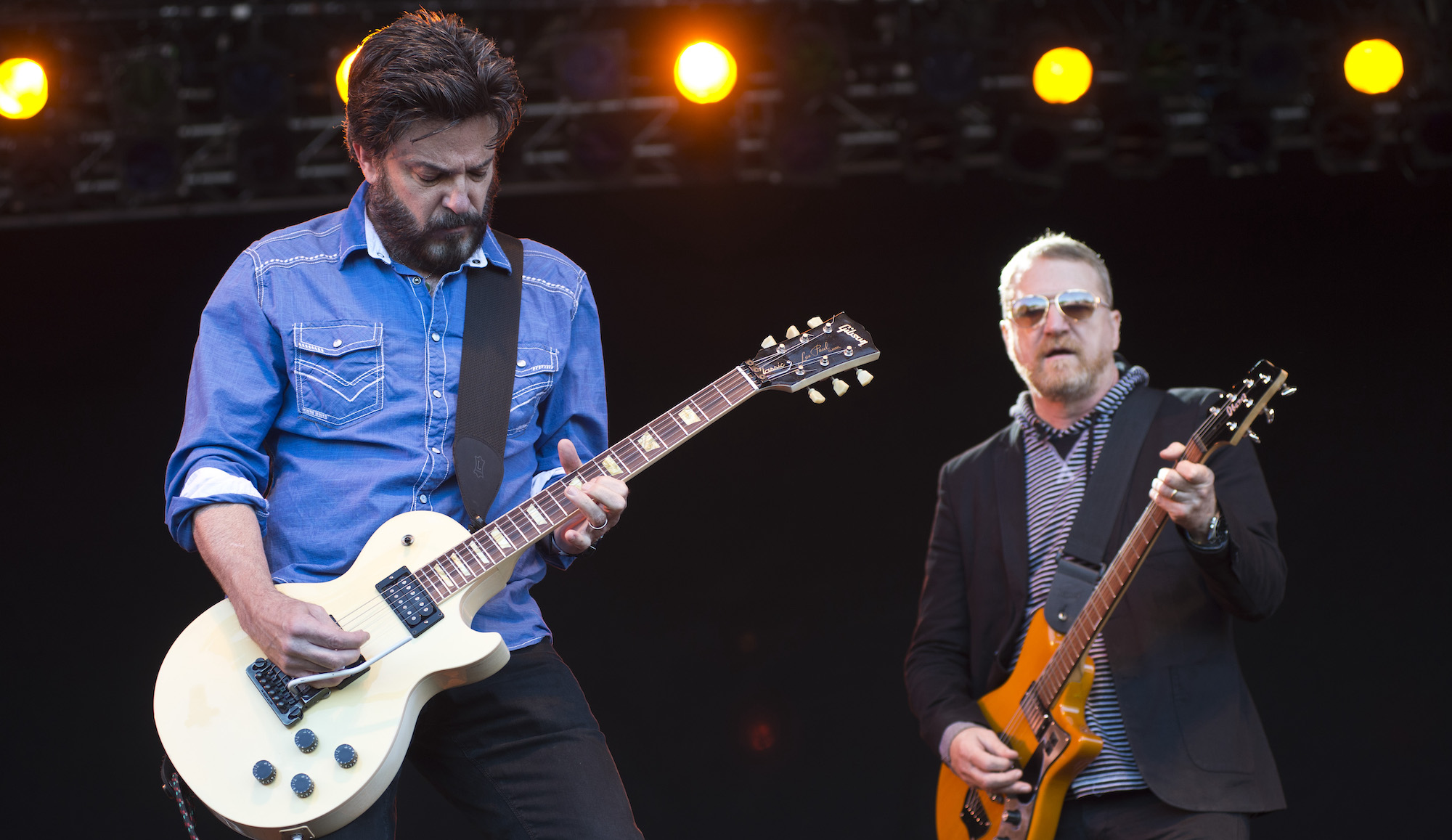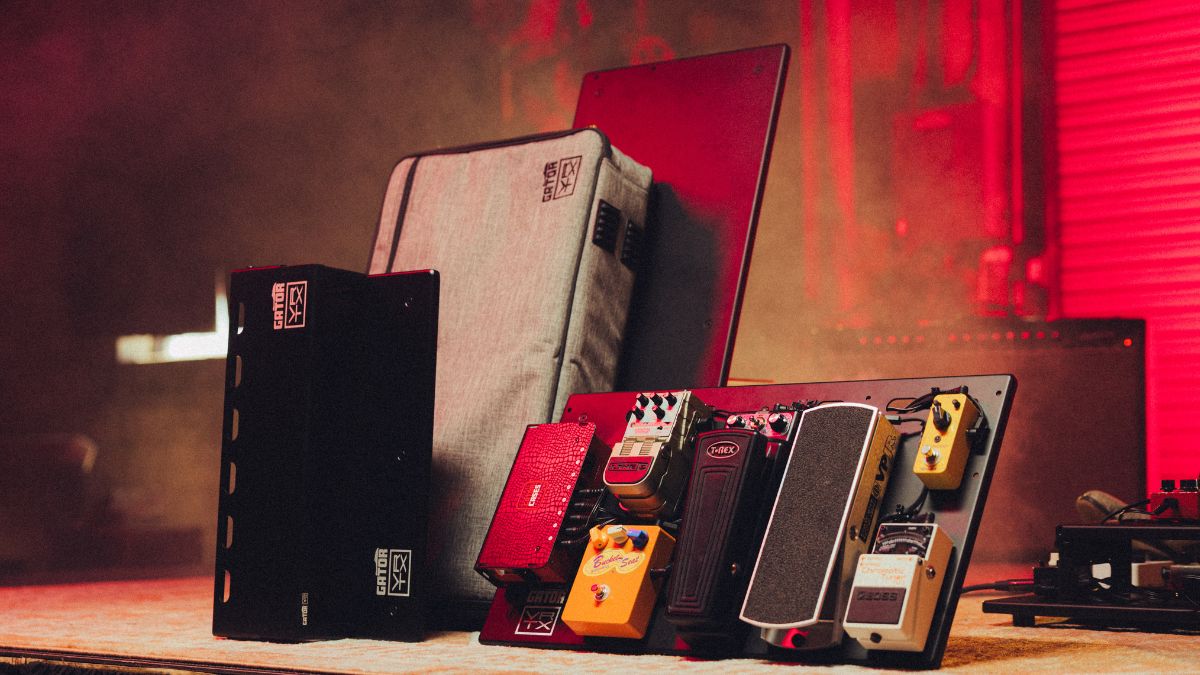“We had four guitarists, which was unheard of at that point”: Johnny Hickman on his pre-Cracker band, the Unforgiven, revisiting the Cracker catalog, and big, bone-headed riffs

Not counting their two founding members – guitarist-frontman Dave Lowery and guitarist-singer Johnny Hickman – 18 various musicians have logged time in Cracker since the band formed in 1990.
“It’s called the ‘Steely Dan model,’” Hickman says, “where you have two singer-songwriter guitar players who are the core of the operation. Cracker Incorporated is David and me. We’ve been friends since we were teenagers, and we’ve been writing songs together for 35 years.” He laughs. “Wow, that’s longer than some of our fans have been alive.”
Hickman admits that he and Lowery have butted heads over the years, but the two have figured out that the best way to keep the peace is to maintain a safe distance.
“David and I live across the country from each other,” he says. “The only times we connect are when we’re in a rehearsal room or we walk out on stage. It keeps things healthy. We have something of a sibling relationship with a little bit of competition. That kind of thing always existed with Mick Jagger and Keith Richards. Tom Petty and Mike Campbell had it. The guys in Oasis – that’s their whole thing. David and I have that same spark of competition.”
The guitarist boils down the Cracker songwriting approach to a simple formula: “I’ll come up with a big boneheaded riff, and David will create a song around it. Or it could be vice versa.”
It’s a construct that’s served them well, particularly during the band’s Nineties heyday, when they logged a succession of riffy, rootsy hits like Teen Angst (What the World Needs Now), Low, and Euro-Trash Girl that dominated college and alternative radio.
In all, Cracker have recorded nine studio albums over the years, all of which are present and accounted for on the whopping 3-LP vinyl, 2-CD set, Alternative History: A Cracker Retrospective.
All the latest guitar news, interviews, lessons, reviews, deals and more, direct to your inbox!
There is, however, a twist; rather than license existing tracks from their former record labels, Hickman and Lowery – following in the footsteps of Taylor Swift, Def Leppard, Prince, Squeeze, and others – simply re-recorded their songs.
The trick to re-recording is to not stray too far from the original, but you want to make it just a little bit better
“We started this some years ago,” Hickman says, “on our Greatest Hits Redux album [2006].
“I’ll explain it in layman’s terms. Virgin Records – and all the people who have bought, sold and bought and sold that entity – own the recordings of those songs. But David and I very wisely never let go of our publishing and our ownership of our creative content, which means we’re free to re-record them and make new versions of them for greatest-hits collections or whatever we want, including this new set.”
For Hickman, the process of revising various tracks of the band’s catalog allowed him to put a fresh spin on some of his guitar performances.
“It’s only natural – you go in with new ears and want to try something a little different,” he says. “The more I play guitar, the more knowledgeable I’ve become about what a song is asking for.
“The trick to re-recording is to not stray too far from the original, but you want to make it just a little bit better. I got to try different effects, different amps. I’ve kind of got my sound narrowed down to a Creston guitar and a Fender Deluxe Reverb. Of course, I love Strats and Les Pauls; they all have their place in what I do.”
Let’s talk about your guitar style. What got you into the guitar, and which players had a real impact on you?
“My parents got me and my siblings into piano lessons, but when I was seven or eight, the Beatles became a thing. Like every other kid in America, I wanted to play guitar. My dad was in the military, and he went to Spain each year. He brought me back this tiny, nylon-string guitar made for small hands. It was really well made.
“I lucked out – most kids got a piece of junk for their first guitar. I had to go to a neighbor to figure out how to tune it. I never took lessons; well, later in life I had a few loose lessons. The Beatles got me going, but pretty soon I got into more ‘guitar players’ guitar players,’ like Jeff Beck and David Gilmour. The Kinks were a big influence, songwriting-wise.”
You were very much into British rock.
“Absolutely. Over time, I learned to appreciate the music that came from the United States – Otis Redding, the Ventures. Once I got into surf music, I realized, ‘Wow, the guitar really can be a voice.’”
Before Cracker, Dave made a name for himself in Camper Van Beethoven, and I remember you were in this band called the Unforgiven.
“That’s right.”
Elektra gave us a shot, but it didn’t work out. There was a huge bidding war for us, and we signed a huge contract. Somebody got that money, but it sure wasn't me
That was one crazy group. You had this whole spaghetti Western vibe, and you had four guitar players. There was a big bidding war for the band, right?
“Yeah, it was crazy. Elektra gave us a shot, but it didn’t work out. There was a huge bidding war for us, and we signed a huge contract. Somebody got that money, but it sure wasn't me. We had four guitarists, which was unheard of at that point. It was two lead players and the other two guys were rhythm. We made it work; there was a place and a purpose for all four guitarists.”
You guys needed a huge contract to pay for your wardrobe. Those leather dusters weren’t cheap.
“[Laughs] Yeah, we had the whole look down. It was a fun idea. We were all into spaghetti Western films, Sergio Leone and Ennio Morricone music. The Unforgiven sort of blended the Clash, the Rolling Stones, and Led Zeppelin with Ennio Morricone. I think we were just a little too weird for the main mainstream.”
You and Dave were friends as kids. Why were you never a member of Camper Van Beethoven?
“Actually, I’m honored to say I was invited a couple of times, but I was a young guy and recently married. I had a little baby, so I couldn’t move up to Santa Cruz [in northern California], which is where Camper Van Beethoven were based.
“Then I was in the Unforgiven and the whole bidding war happened. The stars didn’t align until I quit the Unforgiven – it was apparent we weren’t going to take off. I started writing songs, and eventually the time was right for David and me to do something together.”
Cracker pretty much hit it right out of the box. You guys sounded alternative enough for the early Nineties, but you had that roots rock sound, too.
“You could connect us to grunge a little bit. I mean, we were a guitar band, and we sounded tough. We had that thing I talked about – the big boneheaded riffs and good, melodic songs. It worked from the get-go on alternative and college radio. That’s where Teen Angst went to Number 1; it wasn’t on mainstream radio.”
![The heart and soul of Cracker: David Lowery [left] and Johnny Hickman](https://cdn.mos.cms.futurecdn.net/fvM2EYtRigCnpuGms2CyoS.jpg)
As the Nineties came to a close and we entered the early aughts, alternative bands started to have a tougher time in the marketplace. Was that a difficult period for you guys?
I have a huge appreciation for people like Jerry Reed. His style was funky and kind of country twangy. I combine that with influences like Jimmy Page and Chet Atkins, and I make it one big guitar stew
“Oh, you mean the ever-changing, ever-morphing, so-called music business, as we say in one of our songs? We just stayed true to ourselves and stuck to our guns.
“Our first record after we left Virgin [2003’s Countrysides] was more country-based. I loved doing that stuff, and David loved it, too. I have a huge appreciation for people like Jerry Reed. His style was funky and kind of country twangy. I combine that with influences like Jimmy Page and Chet Atkins, and I make it one big guitar stew.”
Various bands have stuck it to their former managers and record labels in songs. On Countrysides, you guys aimed your ire at Virgin Records with Ain’t Gonna Suck Itself. Pretty subtle.
“Oh yeah! [Laughs] We realized at the time that we were getting nudged over to the little sub label. We had a solid fan base, but we saw that Virgin was signing Mariah Carey for $80 million and they couldn’t afford to give us the budget we needed.
“We put out consistently good records, but we didn’t have another hit like Low. We felt a little shafted, so yeah, ‘It ain’t gonna suck itself, Virgin Records.’” [Laughs]
- Alternative History: A Cracker Retrospective is out now via
- This article first appeared in Guitar World. Subscribe and save.
Joe is a freelance journalist who has, over the past few decades, interviewed hundreds of guitarists for Guitar World, Guitar Player, MusicRadar and Classic Rock. He is also a former editor of Guitar World, contributing writer for Guitar Aficionado and VP of A&R for Island Records. He’s an enthusiastic guitarist, but he’s nowhere near the likes of the people he interviews. Surprisingly, his skills are more suited to the drums. If you need a drummer for your Beatles tribute band, look him up.
You must confirm your public display name before commenting
Please logout and then login again, you will then be prompted to enter your display name.




